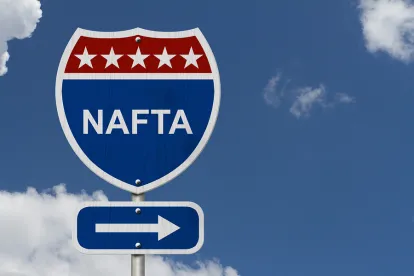The North American Free Trade Agreement has brought massive changes to supply chains throughout the United States, Mexico and Canada over the past 23 years. Now, for the first time, the United States has an anti-NAFTA administration, which is moving forward on its campaign promise to re-negotiate the agreement. The details are far from final, but some of the proposals on the table should concern anyone involved in negotiating supply contracts.
Tighter rules of origin?
NAFTA currently provides for “rules of origin,” which set limitations on the kinds and amounts of inputs from non-NAFTA countries that a product may contain. If a product goes over these limits, it does not qualify for duty-free status under NAFTA. The U.S. is now seeking to introduce a minimum level of 50% U.S. content in automobiles and auto parts, a move aimed at reducing the $64 billion U.S. trade deficit with Mexico (Wall Street Journal, Oct. 11; Bloomberg, Oct. 12).
Transactions across the automotive supply chain could be affected by this change. Sellers to the U.S. under DDP contracts, and U.S. buyers under other contracts, may face an unexpected hit when they are forced to bear increased tariffs. Buyers of Canadian and Mexican products under long-term supply contracts may need to exercise termination rights in order to shift their procurement to U.S. sources. Many parties will need to consider whether and how their contracts permit them to pass increased tariff costs downstream.
“Equal” access to government procurement?
NAFTA currently provides for member countries to open a roughly proportional amount of their government procurement budget to the other member countries. The U.S. argues that this is unfair, and has proposed a “dollar for dollar” system in which each country opens up the same amount of their procurement budget to the others (Wall Street Journal, Oct. 11).
This change risks cutting off Canadian and Mexican firms from selling to the U.S. government. It also poses risks for their upstream suppliers, regardless of nationality: as these firms lose government contracts due to the re-negotiation of NAFTA, they may become unable to perform their own procurement contracts. Some will be able to claim force majeure or other defenses to performance. Others may simply breach. Parties in these supply chains will need to assess what options they have if the end user goes away.
A five-year sunset?
The U.S. has proposed limiting the lifespan of any new NAFTA deal to five years (Reuters, Oct. 12). In other words, NAFTA can disappear entirely, or be replaced by something entirely different, in just five years’ time. This is perhaps the most terrifying aspect of the current negotiations for drafters of long-term contracts (and supply chain participants in general).
For now, nobody knows where the NAFTA negotiations will lead. As the events of 2016 and 2017 have already demonstrated to us, negotiators need to ensure that their contracts are flexible enough to withstand any outcome.



 />i
/>i
